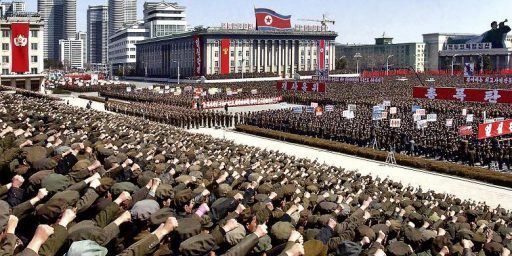Comparative Military Bases
This series of maps is worth a look: What we can learn by looking at where world powers have military bases.
Here are two of them, the US and China:


While such maps do not tell all one might need to know they do undercut two arguments often made in the popular press.
First, it is hard to look at the US map and make the argument that the US has withdrawn from the world (or even has a new, smaller footprint).
Second, while China is a rising power and is asserting itself in its own neighborhood, its power projection capability is limited. Along those lines, it is worth pointing out that despite the small size of some of the red in Asia, there are a lot of US bases in Japan and Korea.
One note: I am unaware of a US military base in Brazil





An unbiased observer might think we were trying to surround the Eurasian landmass.
Add in the NATO allies where we don’t maintain bases but would have friends in the event of a conflict- Norway, the Baltics, Poland – and the fact that we also dominate all the water except the Black Sea, and it’s even more compelling.
This map is wrong. There are no US military facilities in Brazil. There is a detachment of US Marines in the American Consulate in São Paulo, nothing more than that.
@Andre Kenji: That struck me as odd as well, and hence my note at the end of the post. However, beyond that I think that the map is accurate.
They must have meant Columbia. Americans and geography.
@michael reynolds: And their spelling 🙂
Actually: the US-Colombian base deal never went though as far as I know (but there are US troops in Colombia, but not a military base).
I couldn’t recall any American bases in Australia, but apparently there’s a joint U. S.–Australian base near Alice Springs that deals with spy satellites.
@Steven L. Taylor: There are US Military bases in Niger, Ethiopia, Uganda, Seychelles, South Sudan, Djbouti and Kenya. They are not in the map. They forgot all US Bases in Africa and they listed a military base in Brazil that it does not exist.
That´s a much better map.
http://cdn.mg.co.za/content/documents/2013/07/01/Graphic-Military.jpeg-page-001_1.jpg
Comparisons of “bases” are useless:
– What is definition of a”base.” What is the definition of “permanent?” The article claims the map is of “permanent bases” but for several countries the words “base” and/or “permanent” seem to be big stretch. Hence the inclusion of Brazil and Saudi Arabia. Portugal is on the map only because of Lajes AB in the Azores. I’ve overnighted there many times. It’s a beautiful island with great people but there are only a few hundred permanent party US administrative and logistical personnel stationed there. It hardly merits coloring the entire country of Portugal some kind of armed US military outpost.
– Alliances – the US is obligated to militarily defend approx 1/4 of the world’s population due to treaty commitments. China does not have many treaty obligations and what obligations they do have are secret. Given US commitments, permanent bases are a necessity if our treaty obligations are to be taken seriously. Which brings me to….
– This is an apples-oranges comparison. Number of bases is a meaningless metric and Chinese and American strategic goals and methods are very different. Simplistic quantitative comparisons of fixed facilities that don’t account for their importance are not useful. Similarly, just because the Chinese military is much bigger in terms of manpower and some categories of equipment doesn’t mean much as an isolated metric.
So, to the post:
That depends on what you mean by smaller footprint. By most measures that matter, the US footprint abroad is significantly smaller than 10, 20, 30 or 40 years ago.
What does “a lot of US bases” mean in terms of actual military utility? Not everything is a “base,” not all bases are equal and quantification of “bases” is meaningless. If you look at the broad spectrum of capabilities over the last two decades it is pretty clear that our commitments in both Japan and especially Korea are significantly reduced, particularly in comparison with Chinese capabilities in the region.
@Andy: I concur that the more I look at these the more it is clear that the definition of “base” used by the map-makers is problematic.
Still, I stand by my basic statements. There is no country on earth that has military assets spread across the globe the way the US does. This is an empirically true statement. And, further, that presence is not one of a country shrinking back from international engagement (for good or ill).
And, of course, China has similar military capacity in the Western hemisphere? (This would be part of the point).
@Andy: There are also bases scattered everywhere that are secret, exist on no maps, presence denied by the military and are unknown even to members of Congress. Remember the Area 51 denials. Also the Wright-Patterson airfield hangar that was off limits to a powerful senator.
@Andy:
I agree that bases per se is kind of beside the point, and the definitions are stretched. But if anything it understates our reach. If China had something equivalent to our reach they’d have bases in Newfoundland, Bermuda, Cuba, Panama and Midway.
(BTW, I spent a number of months in the area around Lajes. My dad was skipper of the big ocean-going tug operated by the army. Lajes: Where the Air Force runs the ground operation, the Army has the boats, and the Navy flies the planes.)
IMO those who are worried about an imminent military threat being posed by the Chinese need to reflect on the U. S. bombing of the Chinese embassy in Belgrade. The Chinese are still unhappy about that. Very unhappy. But they didn’t retaliate.
If China poses threats, they’re not military threats and we might consider pulling in our horns a bit.
As a final minor point neither the Russians nor the Chinese see our posture as defensive. They think it’s aggressive and all our posturing about defensive containment is just propaganda.
@Dave Schuler:
I concur.
I concur with this as well.
@Steven L. Taylor:
I don’t disagree and would go further and say that’s pretty obvious. I don’t think I’ve ever heard anyone disagree with that. As I pointed out there are strategic reasons why the US has bases around the globe (we have a lot of defense treaties) and why the Chinese don’t (they don’t have defense treaties and are currently focused on their regional military position). Also, it’s important to point out that US bases on foreign soil don’t have carte blanche (with a few notable exceptions like Gitmo)
@Tyrell: There may be some secret facilities but not bases in the sense of a military facility with actual military utility. Area 51, for example, is a research facility, not a location for basing active forces and it’s part of large complex of facilities and bases in Nevada.
@Dave Schuler:
I would just return to the topic of alliances. China is building the military capability to defeat the US in a war in the Eastern Pacific. They are pretty open about this in their doctrinal publications and other military academic research. The reason is that we have defense treaties with neighbors that China might end up in a conflict with, Taiwan being at the top of the list.
Very true and I would not be surprised if we end up driving China and Russia into an anti-American alliance.